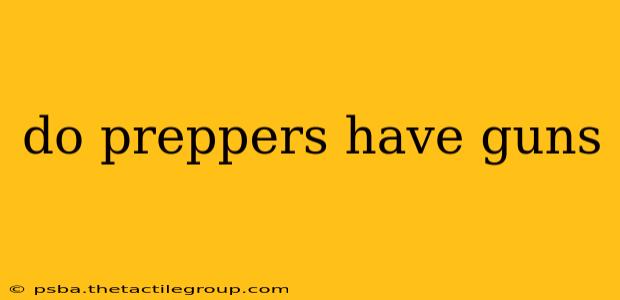Do Preppers Have Guns? A Look at Preparedness and Self-Defense
The question of whether preppers have guns is complex and doesn't have a simple yes or no answer. While not all preppers own firearms, a significant portion do, viewing them as a crucial element of their preparedness strategy. This isn't about glorifying gun ownership, but rather understanding the rationale behind this choice within the broader context of prepping.
The Role of Firearms in Preparedness:
For many preppers, firearms represent a means of self-defense in various scenarios:
-
Natural Disasters: In the aftermath of a hurricane, earthquake, or other disaster, law enforcement may be overwhelmed or unable to provide immediate assistance. Preppers who own guns might see them as a necessary tool to protect themselves, their families, and their property from looters or opportunistic criminals during periods of social unrest or breakdown of civil order.
-
Civil Unrest: While unlikely, some preppers anticipate the possibility of widespread civil unrest or societal collapse, where firearms could offer a means of self-protection. This is a controversial aspect of prepping, often debated amongst practitioners.
-
Self-Sufficiency and Hunting: Many preppers focus on self-sufficiency, and hunting provides a sustainable food source. Firearms are essential tools for hunting game and supplementing food supplies.
-
Home Security: Regardless of societal upheavals, owning firearms is a common approach to home security. Preppers, often living in remote areas or with extensive property, might prioritize firearms for deterring and defending against intruders.
Beyond Firearms: A Holistic Approach to Preparedness:
It's crucial to understand that firearms are only one piece of a much larger puzzle for preppers. A comprehensive preparedness plan goes far beyond simply owning weapons. It includes:
-
Food and Water Storage: Securing adequate supplies of non-perishable food and potable water is paramount.
-
First Aid and Medical Supplies: Having a well-stocked first-aid kit and medical supplies is vital for handling injuries and illnesses.
-
Shelter and Power: Ensuring a safe and secure shelter, as well as a reliable source of power, is critical for long-term survival.
-
Communication Systems: Maintaining communication with loved ones and external support networks during emergencies is essential.
-
Community and Skills: Building a strong community network and developing vital survival skills (like gardening, water purification, and basic repair) are integral to successful preparedness.
Legal and Ethical Considerations:
It’s important to emphasize that the legal implications of owning and using firearms vary significantly by location. Preppers must be fully aware of and compliant with all applicable laws and regulations in their area. Responsible gun ownership includes rigorous safety training, secure storage, and adherence to all relevant legal mandates. The ethical considerations surrounding firearm ownership are equally crucial and should be carefully examined by anyone considering this aspect of preparedness.
Conclusion:
While some preppers utilize firearms as part of their comprehensive preparedness plans, it's not a universal practice. Focusing solely on the firearm aspect ignores the broader scope of prepping, which emphasizes self-sufficiency, community building, and resilience in the face of various challenges. Ultimately, the decision of whether or not to include firearms is a personal one, heavily influenced by individual circumstances, beliefs, and legal considerations. Responsible preparedness involves a multifaceted approach, considering all aspects of survival and mitigation of potential threats.

